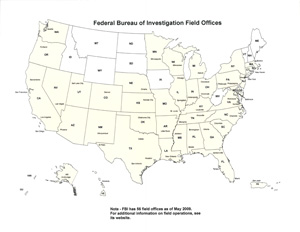FEDERAL BUREAU OF INVESTIGATION
 d
d
In 1908 Attorney General Charles Joseph Bonaparte issued an Order creating an investigative agency within the Department of Justice. The Order was confirmed in 1909 by Attorney General George W. Wickersham, who ordered the establishment of the Bureau of Investigation. The present name, Federal Bureau of Investigation (FBI), was designated by Congress in 1935.
The mission of the FBI is to protect and defend the United States against terrorist and foreign intelligence threats, to uphold and enforce the criminal laws of the United States, and to provide leadership and criminal justice services to federal, state, municipal, and international agencies and partners; and to perform these responsibilities in a manner that is responsive to the needs of the public and is faithful to the Constitution of the United States.
The FBI’s major priorities are to:
- Protect the United States from terrorist attack;
- Protect the United States against foreign intelligence operations and espionage;
- Protect the United States against cyber-based attacks and high-technology crimes;
- Combat public corruption at all levels;
- Protect civil rights;
- Combat transnational and national criminal organizations and enterprises;
- Combat major white-collar crime;
- Combat significant violent crime;
- Support federal, state, county, municipal, and international partners; and to
- Upgrade technology to successfully perform the FBI’s mission.
The major functions of the FBI are to:
- Conduct professional investigations and authorized intelligence collection to identify and counter the threat posed by domestic and international terrorists and their supporters within the United States, and to pursue extraterritorial criminal investigations to bring the perpetrators of terrorist acts to justice. In furtherance of this function, the FBI designs, develops, and implements counterterrorism initiatives which enhance the FBI’s ability to minimize the terrorist threat.
- Conduct counterintelligence activities and coordinate counterintelligence activities of other agencies in the intelligence community within the United States. (Executive Order 12333 includes international terrorist activities in its definition of counterintelligence.)
- Coordinate the efforts of U.S. Government agencies and departments in protecting the nation’s critical infrastructure by identifying and investigating criminal and terrorist group intrusions through physical and cyber attacks.
- Investigate violations of the laws of the United States and collect evidence in cases in which the United States is or may be a party in interest, except in cases in which such responsibility is by statute or otherwise specifically assigned to another investigative agency.
- Locate and apprehend fugitives for violations of specified federal laws and, when so requested, state and local fugitives pursuant to federal statutory authority.
- Conduct professional investigations to identify, disrupt, and dismantle existing and emerging criminal enterprises whose activities affect the United States. Address international criminal organizations and terrorist groups, which threaten the American people and their property, through expanded international liaison and through the conduct of extraterritorial investigations as mandated by laws and Executive Orders.
- Gather, analyze and assess information and intelligence of planned or committed criminal acts.
- Establish and implement quality outreach programs that will ensure FBI and community partnerships and sharing.
- Conduct personnel investigations requisite to the work of the Department of Justice and whenever required by statute or otherwise.
- Establish and conduct law enforcement training programs and conduct research to provide assistance to state and local law enforcement personnel. Participate in interagency law enforcement initiatives which address crime problems common to federal/state/local agencies.
- Develop new approaches, techniques, systems, equipment and devices to improve and strengthen law enforcement and assist in conducting state, local and international law enforcement training programs.
- Provide timely and relevant criminal justice information and identification services concerning individuals, stolen property, criminal organizations and activities, crime statistics, and other law enforcement related data, not only to the FBI, but to qualified law enforcement, criminal justice, civilian, academic, employment, licensing, and firearms sales organizations.
- Operate the Federal Bureau of Investigation Laboratory not only to serve the FBI, but also to provide, without cost, technical and scientific assistance, including expert testimony in federal or local courts, for all duly constituted law enforcement agencies, other organizational units of the Department of Justice, and other federal agencies; and to provide identification assistance in mass disasters and for other humanitarian purposes.
- Review and assess operations and work performance to ensure compliance with laws, rules, and regulations and to ensure efficiency, effectiveness, and economy of operations.
- Effectively and appropriately communicate and disclose information on the FBI mission, accomplishments, operations, and values to Congress, the media, and the public.
Federal Bureau of Investigation Field Offices
 d
d
Click on map for larger version
Return to the table of contents
 d
d